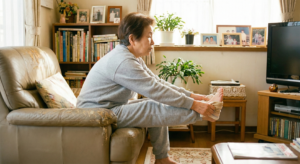Under the long-term care insurance system, depending on the state of need for careSupport 1 and 2 and nursing care 1 to 5and classified as
If a person is initially certified as "Needs Assistance 1," he or she is still at a stage where he or she is highly independent and needs a little support in daily living. However, the level of care may increase due to illness or decline in physical strength.
So what are the actual changes that occur as the level of care increases? Here we will explain the advantages and disadvantages in an easy-to-understand manner.
More services available as the level of care increases (benefits)
When the level of care is high,The scope and content of services available through long-term care insurance will be expanded.
For example, those who require support 1 can receive mainly "preventive care services," and there is a limit to what they can use. Day care services and home-visit care services are also intended for "prevention" and mainly provide lifestyle support.
However, if you require nursing care 1 or higher, you will be able to use "nursing care services". This makes it easier to receive support from
- Home-visit care (home helper)
Not only daily living assistance such as cooking and cleaning, but also physical care such as assistance with bathing and toileting will be available. - nursing in the home
Bathing assistance and functional training are enhanced and may be available for longer periods of time. Transportation is provided, which helps reduce the burden on family members. - Rental of welfare equipment
It makes it easier to borrow handrails, walkers, beds, etc., and improves the safety of living at home. - short stay
It makes it easier for families to take advantage of temporary institutional care programs when they want to travel or take a break.
Thus, as the level of care increases, "assistance to compensate for what cannot be done" is expanded,It makes it easier to create a safe and secure living environment.It is a
Burdens (disadvantages) of increased level of care
On the other hand, there are caveats and disadvantages to increasing the level of care.
1. the person's physical or mental condition is declining
The increase in the level of care means,Increasingly unable to do things in daily lifeThat is to say.
In many cases, the individual loses confidence and motivation due to the increasing number of situations in which he or she feels "I can't do it alone anymore.
2. possibility of increased user fees
The maximum amount of service use (payment limit) increases as the level of care increases, but if you use a lot of itCo-payments will also increase.This will be the case.
For example, the limit for those requiring support 1 is about 50,000 yen, but for those requiring nursing care 1, the limit rises to about 170,000 yen. even with a co-payment of 10% to 30%, the cost can be significant if used more frequently, which can have an impact on the family budget.
3. heavier care burden on family members
As the level of care increases, so does the role played by family members.
Especially if home care requires support for eating, bathing, toileting, etc,The physical and emotional burden on the family is also significant.It will be.
A way to look at the positive even as the level of care increases.
An increase in the level of care is not necessarily a bad thing.
We've advanced to the point where we feel comfortable using their services to compensate for what we can't do."It can also be thought of as a
The following innovations will help you and your family feel positive about the situation.
- Good combination of services
By making good use of day services, home-visit care, and short-stay services, the burden on the family can be reduced while the patient can live safely. - Consult with a care manager
They will help you develop an optimal service utilization plan based on your level of care, so that you will have a clear idea of "which services to use and how much to use". - Continue to do what he/she is good at.
By focusing on "what you can still do" rather than "what you can no longer do," and by continuing hobbies and light exercise, you can maintain physical and mental vitality.
we Taiseikai Groupprovides a wide range of long-term care insurance services and disability welfare services mainly in Numata City, Gunma Prefecture.
- nursing in the homeAt the "K" Line, we support mental and physical health through bathing, rehabilitation, and seasonal events.
- short stayprovides a safe and secure environment while reducing the burden of caregiving on family members.
- Group homes and special nursing homesAt the "K" Line, professional staff provides 24-hour support for daily living.
- Support Services for the DisabledThe company also develops and provides services for people regardless of age or disability, valuing the unique lifestyle of each individual.
We understand that many people are concerned because their level of care has increased, or they are worried about what to do in the future. This is when we come alongside you and support you.
▶ For more information, click here.
Medical Corporation Taiseikai Uchida Hospital // Social Welfare Corporation Kuninkai
summary
As the level of care increases, the number of available services increases, providing the benefit of continuing to live with peace of mind.
On the other hand, it is also accompanied by disadvantages such as reduced physical strength, cost burdens, and increased burden on the family.
What's important.To be proactive about changes in caregiving levels and to make good use of the support they need."It is.
Even if a person starts at the level of 1 requiring support, he or she and his or her family can continue to live a comfortable life depending on subsequent lifestyle modifications and the use of services.
\ Please feel free to contact us if you have any problems /.
Medical Corporation Taiseikai Uchida Hospital Community Medical Cooperation Office
(TEL) 0278-24-5329









